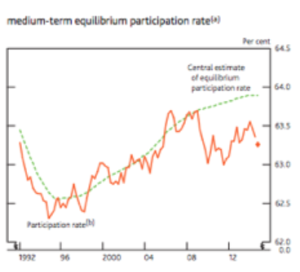Unemployment in 2014-15
5th September 2015
Source: EI Economic Review 2014-15 by Peter Baron
The UK saw a net increase of over 1.6 million jobs in the private sector between 2010 and 2013. The Government estimates that 4 jobs have been created in the private sector for every public sector job lost. Unemployment at 2015 stood at 1.8m or 5.7% of the labour force, compared with 11.7% average for the eurozone. Although employment growth slows over the forecast period, the unemployment rate is likely to fall to 5.2% by end-2015 (Budget forecast).
The MPC estimates that labour market slack has
narrowed substantially since mid-2013 to 1⁄2% of GDP, 
indicating that the UK is moving towards its
production possibility frontier. Should labour market
slack (meaning the unemployed resources of those willing to work) continue to shrink as expected this would be likely to put further upward pressure on pay and unit labour cost growth in 2015. However, the participation rate (the % of the working population in work or seeking work) remains around 63.5% with an increase of 0.5% attributed to changes in welfare benefits.
There have been significant changes in the composition of the workforce. Strong rates of employment growth between 2013 and 2015 (to just over 30m) were characterised by disproportionately large increases in jobs, such as lower-skilled ones, that attract a below-average wage, and so-called zero-hour contracts, which account for 697,000 people (2015) or 2.3% of the workforce. The IOD salutes this trend as a sign of a flexible labour market, whilst others point to growing inequality.
The inequality between skilled and unskilled wage-earners may be seen as a major cause of exploitation and weak bargaining power of labour against capital. It is also attributable to weak union power during times of recession. In addition, the rise in self-employment has also contributed half of the 196,000 jobs created in the first half of 2014. The self-employed are less likely to be unionised.
This structural change in the nature of employment pushed down average wages in 2014 and also tax revenues have been lower than expected. In 2014 Q3, however, there were signs of employment growth in high-skilled employment, which will very likely offset this downward pressure on wages in 2015.

0 Comments